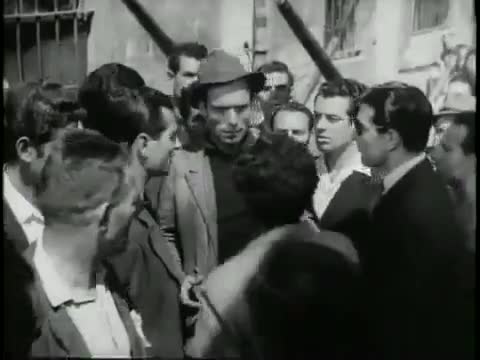Reżyseria:
Vittorio De SicaZdjęcia:
Carlo MontuoriMuzyka:
Alessandro CicogniniObsada:
Lamberto Maggiorani, Enzo Staiola, Lianella Carell, Gino Saltamerenda, Vittorio Antonucci, Giulio Chiari, Carlo Jachino, Emma Druetti, Nando Bruno (więcej)Opisy(1)
Osadzona w powojennych Włoszech biedy i bezrobocia, historia poszukiwań skradzionego roweru doczekała się Oscara w trzy lata po premierze, w cztery – została okrzyknięta przez krytyków filmem wszechczasów. Jej obecność za pontyfikatu Jana Pawła II na watykańskiej liście dzieł o wyjątkowych walorach moralnych podkreśla te wartości społeczne filmu, które mogły umknąć liberalnym apologetom włoskiego neorealizmu. Z jednej strony, historia do bólu prawdziwa – pogrążone w kryzysie Włochy z ewidentnym podziałem klasowym i socjalistycznymi działaczami agitującymi w suterenie, z drugiej, głęboko chrześcijańska w wymowie, zwłaszcza w końcowej scenie, gdy właściciel roweru przebacza zdesperowanemu ojcu na oczach jego syna. Złodzieje rowerów do dziś uniwersalne, do dziś łączą: lewicę, wrażliwą na niezawinioną społeczną niesprawiedliwość i prawicę, zwracającą uwagę na miłosierną twarz kościoła i centralną rolę rodziny. (Mayfly)
(więcej)Recenzje (6)
The starting point may seem ridiculous. A man gets a job and needs a bike to do it. But he doesn't care about the bike. Today, one might dismiss it, but the fact that the film's protagonist doesn't dismiss it either, and indeed cannot, creates a poignant and stark image of Italy in that era. He needs a bike, otherwise he'll be a poor man out of work again. A human testimony about a world where there is no place for every person. At least not the kind they would wish for and need. It's incredibly frightening that this is our world and not one that's particularly distant.
()
For me, this is probably the strongest film of Italian neorealism and Vittorio De Sica. Its attractiveness and power lie in the naturalness that comes from the use of non-actors, knowledge of the filmed environment, and the difficult social reality of post-war Italy, which is struggling with a severe crisis, mass unemployment, and poverty. It is a film that is not burdened by artificial layers of commercial cinema, wherein emotions are conveyed alongside film images only through film music. It is a powerful film that is also emphasized by the black-and-white material. It is incredible how many unforgettable shots fit into just 90 minutes of footage. How many events can be fit into a single day of an ordinary municipal officer who is existentially dependent on his bicycle? The most interesting passages depict the existence of a large Roman lumpenproletariat. Overall impression: 95%. A classic film that is part of basic film education.
()
More than a cross-section of neorealist theory, The Bicycle Thieves struck me as a poignant symbolic statement about its bleak, depressing times. The theft of a bicycle and the subsequent search for it suffice as motives to fully understand the despair and misery of which it so subtly and stoically speaks. Pure cinematic language that doesn't need to exaggerate or rely on star filmmakers, just get out on the street, empathize with your characters and film, and the result will be disarming. 90%
()
A realistic portrayal of Italian society, reconstructed through the tragic story of a poster boy who is confronted with the theft of his bicycle and the subsequent misunderstanding and rejection by the people around him and the police. The film works brilliantly as a social drama, the actors are convincing and the music is appealing. The ending was perhaps a little more subdued, but I'm happy with the rest. All in all, an above average film that manages to captivate contemporary audiences.
()
A sad and depressing film. The beautiful and thorough scene structure and the amount of detail in the film convey the atmosphere of the time to the viewer (they say it's called neorealism -) ) and the ending is downright surprising.
()
Watching the helplessness, despair, and hopelessness of the main character, whose only desire is to work and provide for his family, is a heart-wrenching experience, as we see more and more bitterness and disappointment. The struggle for one's own dignity is even harder because it is not only happening in front of him but also through his son and in the presence of future generations. For a 21st-century viewer, the seemingly uniquely beautiful Rome of the 1940s hides rather a sense of hopelessness from which prayers or God himself cannot help, but so far neither can anything else...
()

